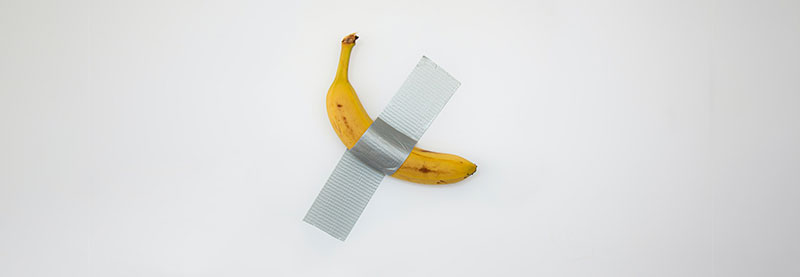Intellectual Property Insights from Fishman Stewart
Mini Article – Volume 23, Issue 13
Share on Social

A Banana Taped to a Wall – Copyright but no Infringement
How many ways are there to tape a banana to a wall? Yes, this is a serious legal question. In fact, this was the question presented in a recent copyright infringement lawsuit in Florida.
Italian artist Mauizio Cattelan is known for his controversial artistic creations, including a piece called Comedian which is a banana duct-taped to a wall. Since its gallery debut in 2019, Comedian has made headlines a couple of times, first when it was sold for $120,000, and then when the banana was eaten by another artist in 2019 and then again when the banana was eaten by a student in 2023. Apparently, art appreciation is hungry work.
Recently, Comedian made headlines as the basis for a copyright infringement lawsuit. Conceptual artist Joe Morford filed a lawsuit against Cattelan claiming that Comedian was a copy of Morford’s earlier made work called Banana and Orange, which featured (as one could guess) a banana and an orange duct-taped to a wall. The judge concluded that no copyright infringement occurred, because despite the similarities between the works—mainly that both works involved bananas taped to walls—there were enough differences between the two pieces of art to find that Cattelan’s Comedian was not a copy of Morford’s Banana and Orange.
According to the judge, the only shared feature between the two pieces was the concept of a banana taped to a wall with the stalk on the left-hand side. Copyright protection applies to expressions of an idea or concept, but not to the concept or idea itself. This limitation also applies where there are only a handful of ways to express an idea. In this case, the judge concluded, there were only two ways to tape a banana to a wall—stalk-left and stalk-right—and thus the concept of taping a banana to a wall stalk-left was not protected under copyright law. So, the judge dismissed the case. We will have to wait and see if there will be an a-peel!
Kristyn Webb is the Group Leader of Fishman Stewart’s Copyright Practice Group, and is currently earning a Master’s Degree in Copyright Law at King’s College London.

Published July 14, 2023


Related Content from Fishman Stewart
People have long pondered whether or not the Giza pyramids were indeed solely burial chambers, which was the only known, and archaeologically determined, use—until now.
By 1930, efforts began in New York to replace Mother's Day with Parent's Day because men were more than just breadwinners. Those efforts didn't catch on, probably because in that era, women often spent more time in the home.
In February, Nike and Skims announced that they will be working together on a new brand, NikeSkims. The co-brand will create a new line of training apparel, footwear, and accessories specifically designed to meet the unique needs of women athletes.
Generally, federal courts have exclusive jurisdiction over copyright cases, and often, this presents an insurmountable paywall for individual artists and small businesses to vindicate their rights, especially where the value of the individual copyrighted works are relatively low.
Dedicated to raising public awareness about the importance of encouraging innovation and creativity throughout the world, the World Intellectual Property Organization (WIPO) annually observes World Intellectual Property Day on April 26 to showcase the role that patents, trademarks, industrial designs, copyrights and trade secrets play in our everyday lives.
Hold onto your foam fingers, sports fans – college sports just got a whole lot more interesting! The latest updates to Name, Image, and Likeness (NIL) rules are making student-athletes bigger than ever, and it’s not just about the game anymore.
Did a federal court in Louisiana recently decide that US copyrights are global rights? It seems so.
One of his most famous songs, “Lose Yourself” was recently at the center of a lawsuit. In 2019, Eminem’s publishing company Eight Mile Style sued Spotify claiming that Spotify streamed a number of its musical compositions without proper licenses.
One of the most common challenges is whether AI should be free to train on data that is protected by copyright and owned by third parties without first obtaining permission.
The U.S. Copyright Office (USCO) recently published its latest report on AI and “copyrightability.” In short, the USCO considers only some AI-generated works to be sufficiently creative as to deserve copyright protection, and thus, registration.
IDENTIFYING, SECURING AND ADVANCING CREATIVITY®












